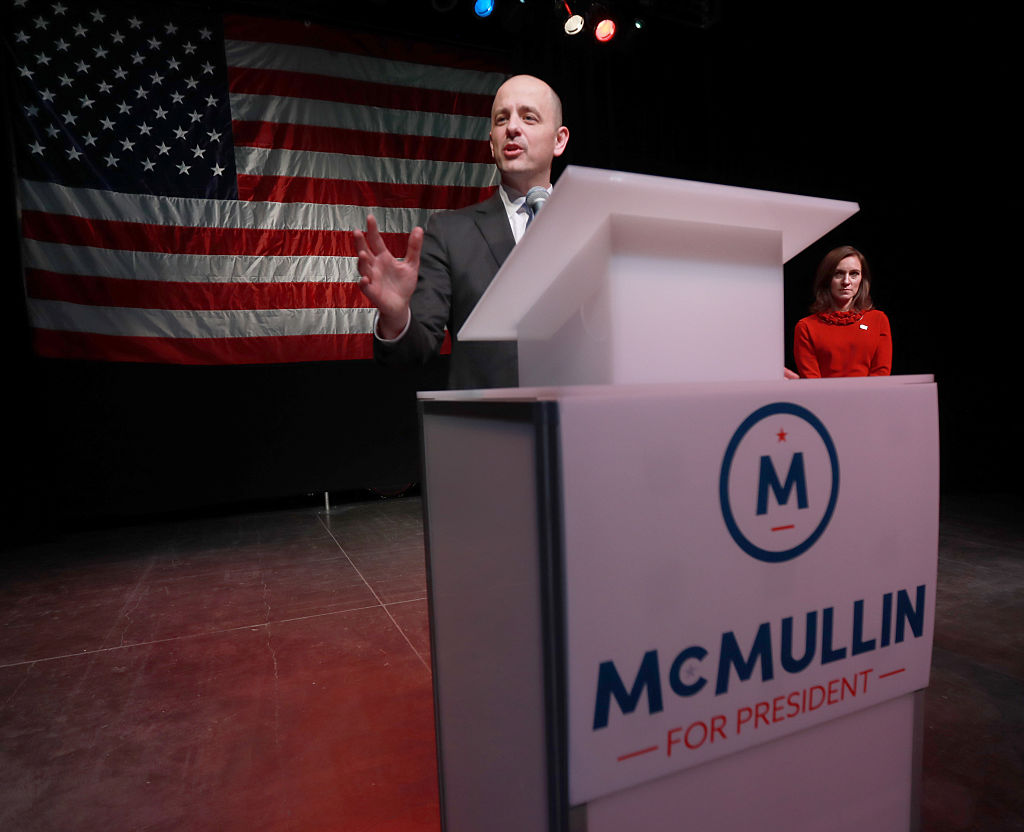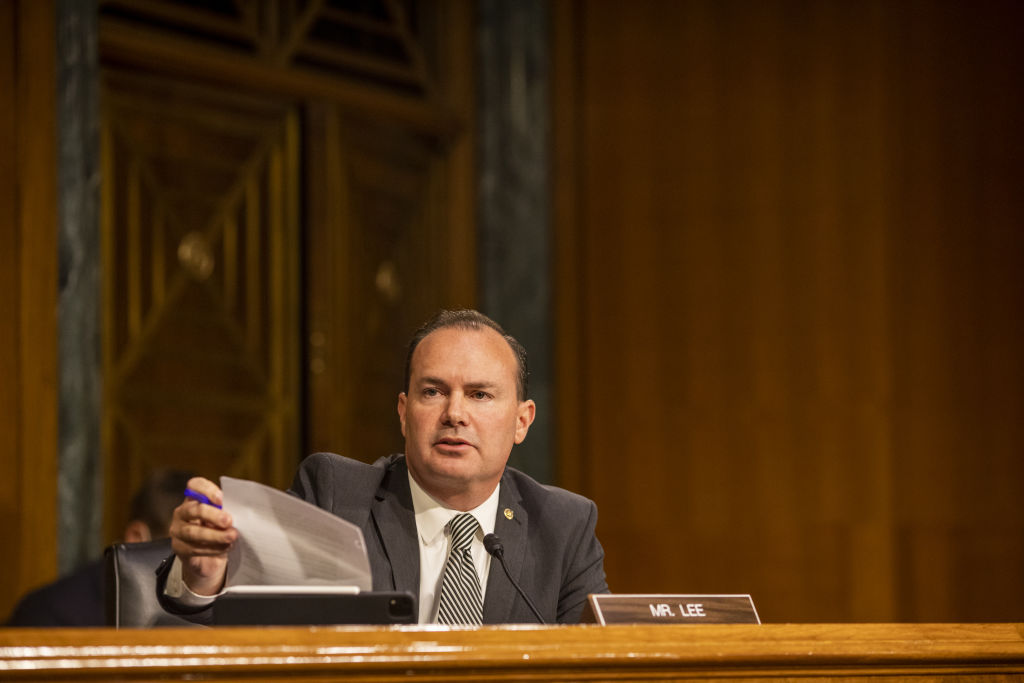
The crowd at Cottonwood High School in Murray, Utah, last month was tense. Amid raucous booing and grating insults, Democrats hotly debated who to nominate to challenge U.S. Senator Mike Lee, whose fealty to Donald Trump has alienated even some Republicans in his state.
The safe option was Democrat Kael Weston, a native Utahn and former State Department official who supports universal healthcare, carbon taxes, and access to abortion.
The other option: formally nominating no one, so the party could effectively put its weight behind Evan McMullin, a former Republican “Never Trumper” running as an independent.
After a heated discussion, the Utah Democratic Party voted 782 to 594 to back McMullin. It was the first time the party had ever chosen not to nominate one of their own for a U.S. Senate seat.
“A majority of Utahns want to replace Mike Lee,” McMullin, a former CIA officer, tells me. “But if that majority is divided in the general election, it would be much more difficult to make a change.”
The decision by Utah Democrats to throw their lot with McMullin is the latest example of how the enduring strength of Trumpism in many parts of the country has scrambled the political landscape. But the coalition forming behind McMullin also reflects Utah’s idiosyncratic stew of religion and conservatism, and Democrats’ anemic standing in the state. The last time a Democrat in Utah won a U.S. Senate race was 1970.
“I want to preface this by saying I love Kael,” says state representative Andrew Stoddard, a Democrat who backed McMullin in the nominating contest. “I’ve interacted with him in so many different arenas. He’s thoughtful, he’s a wonderful human.”
“That being said,” he continues, “we haven’t elected a Democrat to the Senate in my entire lifetime. And I think as members of a super-minority here in the state, if we’re going to keep doing the same things, we’re going to get the same results.”
But in trying this Hail Mary—forming a coalition among Democrats, independent voters, and anti-Lee Republican voters in a state that Trump won with 58% of the vote—Utah Democrats risk fracturing their already feeble party. Some say, irreversibly.
“We’ve never seen anything like this in Utah,” says Todd Weiler, a Republican state senator. “It would be one thing if no Democrat had filed for U.S. Senate, but they had Kael Weston file, and he was clearly qualified.”
Do independent Senators have more or less influence?
In some ways, McMullin is the perfect candidate for his state. Like 62% of Utah, he is Mormon, and he attended Utah’s Brigham Young University. Like 70% of Mormons, he has relatively conservative political views. Up until 2016, McMullin was a Republican, having worked for GOP members of Congress and volunteering for Mitt Romney’s presidential campaign in 2012.
But perhaps no red state was less welcoming to Donald Trump in 2016 than Utah, where the Church of Jesus Christ of Latter-day Saints places a high value on modesty and fidelity. The emergence of the brash, twice-divorced, thrice-married Trump, who was caught on tape bragging about being able to grab women by their genitals because of his star-status, prompted a not-insignificant faction of the state’s Republicans to seek an alternative candidate.
McMullin emerged to fill the void, running a long-shot presidential campaign in which he made it onto the ballots of just 11 states. Though he secured less than 1% of the vote nationally, he drew 21% in his home state of Utah, finishing third there behind Trump’s 45% and Hillary Clinton’s 27%.
Lee was among the 244,000 Utahns to cast a ballot for McMullin in 2016. But soon after Trump took office, Lee made his allegiances clear. He became one the new president’s most outspoken and reliable supporters. Text messages gathered by the House committee investigating the Capitol riot reveal Lee communicated with Trump’s chief of staff Mark Meadows in the weeks after the 2020 election about overturning the outcome. (Lee ultimately did not vote to overturn any state election results.)
Lee presents a similar risk to democracy that Trump did, McMullin argues, adding that Lee has become a “poster child for the politics of extremism and division.”
Citing Lee’s Senate votes against funding for 9/11 first-responders and being one of just two Senators to vote against a bill that included Russian sanctions for meddling in the 2016 election, McMullin says that “instead of participating in a constructive way,” Lee chooses to be “a performative obstructionist.”
Lee’s office did not respond to a request for comment.
McMullin says he’s committed to being an independent voice in Washington if elected. He has promised to use his position in the Senate to bolster voting rights, lower drug prices, counter violent extremism, and protect Utah’s land and water. Though, unlike Weston, the Democrat who failed to draw his party’s nomination, McMullin has previously stated his opposition to Planned Parenthood funding and the Paris Climate Agreement.
Ultimately, for Utahns, the “difference between having Mike Lee and having Evan McMullin as Senator,” says Jim Curry, an assistant professor of political science at the University of Utah, wouldn’t be “that dramatic.”
But McMullin himself offered one way in which the situation would be very different: He does not intend to caucus with either the Democrats or Republicans in the Senate.
“I will not caucus,” he tells TIME. “I’ve got to maintain my independence in order to represent all elements of this coalition.” He says this independence will “allow Utah to have a much greater voice in our national politics than it currently does.”
If he were to win, McMullin would be the third independent in the Senate, joining Bernie Sanders of Vermont and Angus King of Maine. Both Sanders and King, however, caucus with Democrats despite being independents. Doing so gains them certain privileges, including most importantly, being assigned by party leadership to influential Senate committees, where bills are debated and polished.
Thus, if McMullin were to win and stand by his decision not to caucus with either party, he could find himself with considerably less power than other Senators, regardless of which party controls the chamber.
‘Democrats will be less likely to vote.’

The caucusing issue, of course, is only relevant if McMullin is elected. It’s unclear whether his odds are any better than they were six years ago when he ran for President. Some of the state’s political experts and politicians say they are worse.
It was Utah’s faith-driven aversion to Trump that allowed McMullin to draw one-fifth of the presidential vote there in 2016, says Weiler. But Trump isn’t on the ballot this year. And McMullin’s strategy of wearing his church membership “on his sleeve” as a means of showing Utah voters he’s like them has its limitations. “The problem he has now is that Mike Lee is Mormon, too. He’s not Donald Trump,” says Weiler. “And so that worked to a certain extent in 2016. I don’t think that’s going to work in 2022.”
And beyond the uphill battle McMullin faces to win in November, he also stands to further weaken the state’s already frail Democratic party by dividing its relatively small base of supporters. The infighting on display at the state’s Democratic convention in April was just the beginning. The reverberations could extend to the ballot box, with some political observers predicting that McMullin won’t just lose the Senate race, but drag down the performance of Democrats lower on the ballot, and discourage some party advocates from further participation.
“Democrats will be less likely to vote, because there’s no Democrat on the ticket,” says Curry. “There’s no gubernatorial race, there’s no other statewide race. So this was going to be the big draw. And now they don’t have a big draw at the top. And what typically happens when you don’t have a big draw at the top of your party is that a lot of people just stay home.”
Bonnie Billings, who worked for Weston’s campaign and served as a delegate last month in the contentious nominating convention, is among those who were discouraged by the nominating convention’s move to back McMullin over a Democrat. It left her so frustrated that she resigned as a delegate and local party leader the next day. “The Democratic Party struggles in Utah anyway,” she says. “This move is going to make us even more irrelevant.”
She pauses for a moment, then clarifies: “Well, I shouldn’t say ‘us.’ I’m not part of the party anymore. It’s going to make them more irrelevant.”
More Must-Reads from TIME
- Cybersecurity Experts Are Sounding the Alarm on DOGE
- Meet the 2025 Women of the Year
- The Harsh Truth About Disability Inclusion
- Why Do More Young Adults Have Cancer?
- Colman Domingo Leads With Radical Love
- How to Get Better at Doing Things Alone
- Michelle Zauner Stares Down the Darkness
Write to Abby Vesoulis at abby.vesoulis@time.com